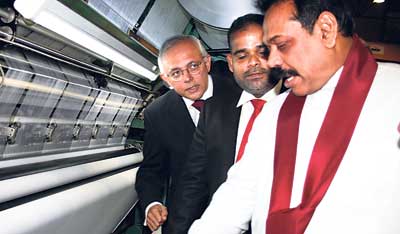
World’s first clean fabric manufacturing zone opens in Sri Lanka
The world’s first eco friendly fabric and apparel manufacturing zone began business in Thulhiriya in north central Sri Lanka on Friday. Fabric manufacturing is known as a polluting industry but on Friday the MAS Fabric Park went public as the world’s first fabric and apparel manufacturing zone based on an eco-friendly blueprint. “Traditionally the garment industry is seen as sweat shops and fabric mills are seen as polluting. So we are reversing the tradition from Sri Lanka. The MAS Fabric Park is going to be the world’s first eco-friendly fabric and apparel manufacturing zone,” MAS Holdings Chairman Mahesh Amalean told The Sunday Times FT. The MAS Fabric Park was previously the Kabool Lanka textile manufacturing zone that was out of operation for a number of years and last year the government handed over management of the facility to MAS Holdings. MAS is now completely overhauling and modernising the zone on an environmentally friendly framework. The eco-friendly manufacturing zone is costing the company a thumping US$ 25 million to create. MAS has already invested heavily in water and affluent treatment and other environmentally friendly design aspects. “We have invested in modernising existing facilities to world class standards and we are ensuring that everything is built to be eco-friendly. Previously the site only had a biological treatment plant. We have now put in a chemical treatment plant. We are working with international designers and contractors and we are getting the best systems. For instance, we have a Swedish clarifying system for water and we are building a submerged flow wetland, as a soakage area,” explained Amalean. In keeping with its environmentally friendly theme, much of the output of the park will be recycled and reused. For instance, the company has agreed to share its treated water with farmers in the neighbourhood to be used in farming activity. The park will also generate bio-gas that will be used for cooking and other waste matter will be converted into compost and used as fertilizer. The company says it is also in the process of getting internationally recognised certifications to back up its claim of being an environmentally friendly fabric and apparel manufacturing facility. Investments, technology and jobs The fabric park is expected to bring in US$ 100 million worth of investments over the next 5 years. Already the park has attracted four investments adding up to around US$ 60 million. These include a warp-knit manufacturing facility by Dogi-EFA and a fabric printing unit by Text Print, both Spanish companies, a local investor Bam Knitting and an eco-manufacturing factory by MAS Holdings to produce clothing for UK retailer Marks & Spencer. The park will also fill backward integration gaps in the local garment sector. The Dogi –EFA factory for instance, is expected to meet total domestic demand for warp knitted fabric. This is expected to save the country about US$ 100 million in foreign exchange per year that is otherwise spent on importing the fabric. Accommodating specialised technology is expected to have other add-on benefits. “When you have world class operations, it will attract other world class manufacturers here. It will also attract the bigger brands and retailers into the country,” said Amalean. Warp knit fabric for instance, is used for specialised items like lingerie and swimwear that are high priced, niche exports. The Dogi EFA unit in the MAS Fabric Park is currently the first export scale warp knit fabric manufacturing unit in whole of South Asia. So this is expected to act as a magnet to more business. However, at this point only around 40% of the park’s capacity is utilised and the park is on the look out for potential investors. “MIMT will provide apparel and IT training. We have entered into a partnership with Informatics to provide IT training,” said Amalean. |
|
||
| || Front
Page | News
| Editorial
| Columns
| Sports
| Plus
| Financial
Times | International
| Mirror
| TV
Times | Funday Times || |
| |
Reproduction of articles permitted when used without any alterations to contents and the source. |
© Copyright
2007 | Wijeya
Newspapers Ltd.Colombo. Sri Lanka. All Rights Reserved. |
